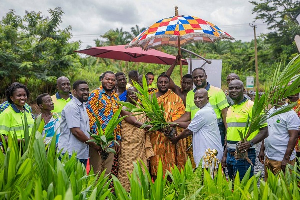 Executives captured in a photo with oil palm seedlings
Executives captured in a photo with oil palm seedlings
After distributing 30,000 high-yielding oil palm seedlings to farmers in 2023, mining giants AngloGold Ashanti have once again distributed 60,000 more oil palm seedlings to farmers in six districts in the Ashanti Region.
The idea to distribute oil palm seedlings to farmers feeds into plans by AngloGold Ashanti to improve the livelihoods of farmers through oil palm production by 2026 while contributing to the country’s deforestation mitigation targets through agroforestry by the same year.
Christened the Climate Resilience Oil Palm Plantation (CROPP), the project is a collaboration between AngloGold Ashanti Obuasi Mine and Solidaridad West Africa, and rolled out in six districts within the Adansi Traditional Area namely; Obuasi Municipal, Obuasi East District, Adansi North and South, Adansi Asokwa, and Adansi Akrofuom District Assemblies.
Worrying State of Degraded Lands
According to the Economic Development Superintendent of AngloGold Ashanti, Daniel Arthur-Bentum, most arable lands in the Adansi enclave have been significantly depleted as a result of illegal mining.
This, he said, has caused rising temperatures, increased inconsistencies in rainfall patterns, reduced suitable areas for farming, and reduced farm yield, adversely affecting livelihoods. He said the CROPP initiative is a demonstration of AGA's commitment to promoting sustainable development and addressing the challenges posed by climate change.
To achieve this, Mr. Arthur-Bentum said, "Since we launched season one of the CROPP initiative in 2023, our strategy has been to support existing oil palm farmers in the six local Assemblies to adopt climate-smart practices through capacity building and technical support."
He added that they work in close collaboration with traditional leaders and local authorities to identify and convert degraded lands into oil palm agroforestry block farms and facilitate the setup of an oil palm nursery to supply climate-resilient seedlings to farmers.
The Economic Benefits of the CROPP
The initiative is expected to improve the economic livelihoods of the beneficiary farmers who have formed cooperatives. The money generated from the oil palm will be reinvested to keep the program rolling. This, according to the Economic Development Superintendent, will need the commitment of the farmers.
He said, "By harnessing the power of agriculture and forestry, we are not only creating economic opportunities for our communities but also making significant strides towards building a more resilient and sustainable future."
Stakeholders Involvement
According to the Chief Executive of the Obuasi Municipal Assembly, Honorable Elijah Adansi-Bonah, the CROPP project by AngloGold Ashanti is in sync with the government's flagship program, Planting for Exports and Rural Development (PERD), which has seen the distribution of almost one million oil palm seedlings in Obuasi.
He commended AGA for their bold policies, which are geared towards contributing to the development of Obuasi and neighboring districts. The Obuasi MCE stressed that investment in oil palm seedlings in Obuasi will aid the establishment of an oil palm processing factory, which will have no issues with the availability of raw materials.
Nana Osei Kwame, Amanehene of the Eduabiase traditional council, who represented the Edubiasehene, commended AngloGold Ashanti for their projects and programs highlighted in their 10-year Socioeconomic Development Plan. He said the plan to reclaim destroyed lands was laudable, urging farmers in the beneficiary districts to take full advantage.
Aboagye Ohene Adu, a farmer in the Obuasi Municipality, added his voice to the need for farmers to leverage the CROPP program to improve their livelihoods and contribute to afforestation.